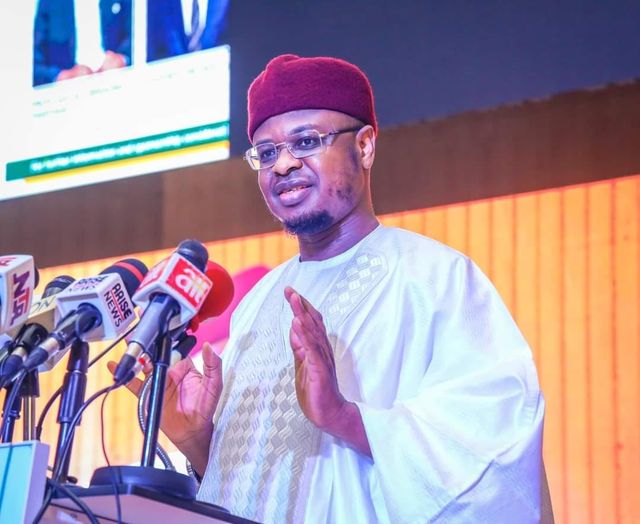The Honourable Minister of Communications and Digital Economy, Professor Isa Ali Ibrahim (Pantami), has reiterated that the use of emerging technologies in combating insecurity remains a veritable tool which Nigeria will continue to capitalise on, as government and stakeholders are pointing towards digital technology as the next available option to help reduce the scourge of insecurity in the country.
Prof. Pantami, who was represented by the Director General of National Information Technology Development Agency (NITDA), Kashifu Inuwa CCIE said this during a paper presentation at the National Students Security Summit 2022 organised by National Association of Nigerian Students (NANS) at the International Conference Centre, Abuja.
He said that the rapid advancement of technology has brought about the term Emerging Technologies that are new, and they have not been fully explored or are still under development, and new cases are discovered every day.
According to the Minister, the technological revolution is transforming lives at breakneck speed, dramatically altering the way people work, learn and live together.
He stated that Emerging Technologies such as Artificial Intelligence, Blockchain, Cloud Computing, Quantum Computing, Augmented Reality, Internet of Things and Robotics are exponentially growing and finding new applications in an ever-increasing number of sectors, including the way people receive, exchange and process information for security activities.
The Minister further said that unstoppable as insecurity is, the country has continuously explored various approaches to mitigate security challenges.
“You would all agree that the ongoing Fourth Industrial Revolution (4IR), characterised by digitalisation and automation, is cutting across all sectors of industry and humanities. The copious role of digital technology in tackling insecurity can never be underestimated; making it a veritable tool for defeating all security threats in the country.
“It is pertinent to understand that advances in technology are reshaping global security capabilities, from enhancing the way borders are monitored to helping mitigate insecurity, the impact of natural disasters to intelligent detection, the identification of criminal activities to automatic detection of crime associated menace in the society,” he added.
Pantami further stated that these new challenges and opportunities are currently being utilised in facilitating digital solutions and building capacities to address national security challenges in Nigeria. Adding that Federal Government is not unmindful of the role of emerging technologies in a sustainable digital economy and national security issues.
He said that the National Information Technology Development Agency (NITDA), National Centre for Artificial Intelligence and Robotics has been established to foster the development of emerging technologies in preparing Nigeria for the Fourth Industrial Revolution via research and development of technologies like drones, robotics and Artificial Intelligence.
Pantami said to curb cybercrime activities, NITDA rejigged its Computer Emergency Readiness Response Team (CERRT) in response to the increase rate of cybercrime and fulfilment of the requirement of the National Cybersecurity Strategy.
He added that CERRT functions in coordinating and facilitating information sharing, providing mitigation strategies and recommendations for the incident response and recovery, researching and analysing trends and patterns of incident activity for government Ministry, Department and Agencies (MDA) with extension to the private sector.
“We are taking steps to establish National Public Key Infrastructure to ensure the protection of Nigerian systems in cyberspace. We are establishing National Emergency lines in almost every part of the country to ensure citizens’ communication access. We are creating cybersecurity awareness across geopolitical zones to educate Nigerians on the potential of cyber threats. Every Nigerian must be aware of his responsibilities as far as security is concerned, and each person must be safe,” he added.
In an attempt to create a safe digital environment, the Minister said that President Muhammadu Buhari has approved the designation and protection of relevant telecommunications infrastructure across the country as Critical National Infrastructure (CNI) towards supporting implementation.
The Minister added that Government at all levels, private and other critical stakeholders in the technology ecosystem are expected to respond more rapidly and effectively to the unique opportunities emerging technologies could bring to Nigeria’s security administration.
Pantami stressed that, “as government, we would channel our energy towards creating an enabling environment for innovation in emerging technologies that could be harnessed and utilised effectively to the country’s advantage. We would develop integrated frameworks and approaches for adopting and deploying Information and Communications Technology (ICT) in national security architectures. We will continue to create suitable platforms to foster trustworthy collaborations between the country’s public and private technology community and civil society organisations.”




